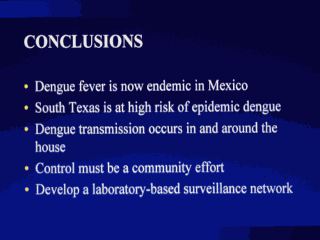 |
There is no specific treatment for dengue fever. Moreover, vaccine development is difficult since any of four different dengue serotypes may cause the disease, and because protection against only one or two of these serotypes might actually increase the risk of more serious disease. Nevertheless, progress is being made in the development of vaccines that may protect against all four serotypes. At present, the only method of controlling or preventing dengue and dengue hemorrhagic fever is to combat the vector mosquito which, in Asia and America, breeds primarily in man-made containers such as bottles, cans, used tires and other items that retain water. In Africa, however, it breeds both in artificial containers as well as in natural habitats.
Control of dengue at the present time is dependent on control of the principal vector,
Aedes Aegypti. Efforts to achieve such control must now be focused on community education and action towards eliminating this mosquito's breeding sites near human dwellings. As a result of the continued infestation of the South Texas/Lower Rio Grande Valley with
Aedes Aegypti, indigenous transmission along the United States-Mexico border remains a public health concern for both governments. Yet, the political boundary that artificially separates the two nations belies the true interdependence, both economic and social, on either side. Ultimately, it is this political boundary that determines in the end how any or all concerns about public health along the United States-Mexico border must be addressed -- with diplomacy and cooperation through the international political process.

|
Go to Comment Form
|
|